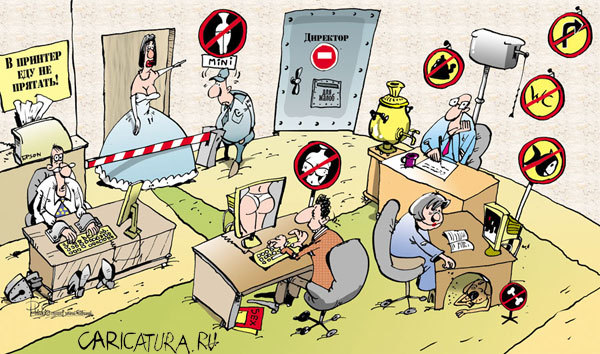
Part 1. Job Search: Sources, Resumes, HR Interviews
Part 2. Device and adaptation: interview with the boss, we pass the trial period with a breeze
Part 3. Work as a newcomer: growth in the company
Part 4. Work as an experienced employee: how not to burn out
Part 5. Dismissal: I am leaving beautifully
I work work at work - why?
The course of your career depends on what you want from it. Set goals: why did you come to this job? Of course, there can be no single reason, but some one always prevails. It is she who will form the basis of your behavior and your development in the company.
- An interesting area, an interesting project. This is one of the best options: if you are ready to invest in the development of the project (even for less money), you will greatly pump yourself up as a professional. The commonality of interests within such companies (or even a project within a large company) smooths out many problems, and in fact, from the first days you can become a full member of the team. Worse, if only you have interest, and the rest of the team has a routine; in this case it will be difficult, you will be a black sheep.
- High (or necessary) income. An excellent motivator in order to survive the period of adaptation and not rush to leave for every offensive word or missed task. As a rule, commercial companies know what they pay money for and need to be prepared to work on the entire proposed amount. Problems can be related to competition with other employees, with teamwork (slowing down processes, weak links, “employee-trailers” on the project).
- Prospects for career growth within the company. As a rule, this item is definitely not one; it is paired with several others. If your general goal is to occupy a high position in the company, look for your strategy, rely on professionalism and try to find yourself a “mentor”, that is, a person who will direct your development without a catch. Only know how to be grateful, and not to sit and wipe. From such a career, one can only expect the law of a boomerang.
- Career step - a company is needed for portfolio and resume. It happens that the tasks are “well, takoe”, and the money is so-so, but there is an opportunity to get a good position and start from it to start a new company on good conditions. If this is the only goal, get ready for competition and firmly follow the professional path, be prepared to apply soft skills, seek compromises, and sometimes, alas, balance on the verge of morality. Do not go over the heads.

You never know who bends to tie the shoelaces :) - Just a forced exit to work. Not the best option that most often awaits us at the beginning of a career or when moving into a new sphere. In this case, it’s better to just do your work in good faith, communicate normally and be away from career games. In general, look for joy in work. Sometimes a temporary option will drag on for 6, or even 10 years. And this is serious, without sarcasm.
Life hacks
Before diving into work, remember a few tricky life hacks - they will help you.
- Take a closer look at the traditions and habits of your team (department, open space) and do something within the framework of these features: bring tasty food, fruits, play games after work, spend Friday evening for beer with chips and debates for life and work. Do not focus on your joining, everyone will notice everything.

New office through the eyes of a newbie - If the company welcomes BYOD or it is simply not forbidden to use your gadgets, take a tablet or a small laptop with a separate mobile connection with you - so you can avoid troubles due to wandering around left sites and social networks. networks. Even in the best and most loyal counters in the world, they can pay attention to this at first.
- If the company has an internal security service (not security, but real information security), try not to arouse suspicion among them: large printouts, flash drives, personal mail, and so on. wait. Innocent actions can cause not idle interest.
- Carefully study the corporate portal or corporate chat, even if you are a stern uncle, an alien to gossip and a proud professional. These oases of informal communication will tell you a lot about your colleagues, company, situation and leadership.
- The hardest thing is to be new to the next new one. As soon as someone else appears in your unit, consider everything, you are an old man. If up to this point it did not work out very well with the team, take patronage over the new one: a) everyone will be glad that this task has been removed from them; b) you will receive a guaranteed ally and friend for a while (it happens that forever).
You shouldn't do that
- Climb with tips on developing a business, code, team in the first few weeks, or even months of work. This is at least indecent, and the maximum is absolutely stupid: if you start pouring tips without understanding the processes, business, company relationships, you will look like a layman.
- Impose your own styles or standards introduced from previous work: code style, technology stack, communication rules, etc. The company in which you got a job has its own rules and processes based on experience, requirements, and business specifics. A little later, you will be able to propose reasonable changes, improvements, but in a completely different form, and not in the form: "And we have LLC" Camomile "...".
- Hack information systems and test the infrastructure for strength. Do you need to explain? Probably not. No, even in search of vulnerabilities and protection it is not necessary - it is better to tell your sysadmin or leader about your suspicions. So you will protect both the company from possible gaps, and yourself from unnecessary suspicions. But when you become “yes, we have it since the beginning of the century”, you can safely pentest - who, if not you :-)
- Ask personal questions to and about colleagues. You can ask about a car or a hobby, support a conversation about travels, but you should not find out whether this chick is married with a white Iroquois, whether the severe boss has children and family, and what kind of faith the admin Ivan Ibragimov professes.
- Ask questions about income levels. Firstly, it is indecent, secondly, this information will not give you anything but nerves, thirdly, in most companies such issues are officially recognized as unethical, prohibited and may be punishable by measures up to dismissal.
- Ignore or laugh at corporate culture. Yes, corporate events are stupid, activity unnecessary, congratulations stupid. But, firstly, this is already an established process and it needs to be adopted, and secondly, corporate culture is also the work of your colleagues, for example, HR or even DevRel. But you can offer to make mitaps, tickets for conferences, meetings and intellectual games a part of the culture.
What to do to grow in the company?
I have an interesting work history. The first 3 places of work in 2006-2007: 8 months, 13 days and 6 months. The reasons for leaving were drawn instantly: a bad boss, a distant location, uninteresting tasks. Well, young green. This would continue even if the HR director of a large office had not told me: “We are taking you. But with such periods of work, no one will take you soon. The stone in place is overgrown. You’ll always have time to quit, but to survive, get together and change yourself a little is a useful experience. ” That company was given 5 years and half a soul, despite as much as a year and a half of difficult adaptation. The company did not come out of a frightened yellowhorn, but an experienced young professional who, even without an interview, was taken to a new company.
Honestly, now in IT, and not only in them, it’s even more difficult - you have to grow among young and early, aspirants, experts, imaginary experts, favorites, etc. Therefore, the strategy “be pros and be what will be” does not work: you must try to work in several directions. Even if your extrovert is open to the world, even if your introvert does not accept anything but professionalism and anarchy.
- To work well. Your cap.
- Do not be afraid of mistakes. The one who does nothing is mistaken. It is important to know how to find your mistake and how to fix it, but at the same time remember and never repeat it again. Adequate managers calmly relate to mistakes, help to cope with them.
- Bring something new to the work. This is especially easy to do in IT. This does not mean that you need to agitate the whole team to rewrite the entire project on Brainfuck, but you must definitely use some new ways to make your software better, faster, more reliable, introduce new functions. Be on your team early bird.
- Create your own unique block of activity - aerobatics. If you can create a new direction in the work of the company and engage in its development, this will be a great way to play a key role in the company. It is not necessary to come up with a new product, it can be a new way of promotion, and the transition to microservices, and the transfer of infrastructure to Linux, and so on. The main thing to remember is that your races must be races: payback, useful and manageable.
- Talk with your leader as the first among equals. No ingratiation, flattery, servility - only a working dialogue, a reasonable argument, the ability to defend one’s opinion and accept someone else’s. If the leader is tyrant, try to just work well, if active tyrant - there is an instruction below on how to change the department. Alas, sometimes you lose more nerves than you get profit.
- Continuously learn and develop. Read special literature, Habr, study English, master new technologies. IT is how it works: you got the flu, went to the sick-list, returned - everything is new, you are overboard :-) But seriously, learning develops thinking and allows you to think more broadly. Do not stop, lag behind.
- Show soft skills. The story about udalenka, seals and total introversion is also close to me, I understand most of you. But now is the time of not just professionalism, but also, if it is not right, of emotional intelligence: you need to be able to get along with people, communicate, build social ties, make good acquaintances. In general, to be not just smart, but also a cool guy (girl).
- See the horizon of your career. Do not forget about yourself: monitor how you grow in your career plan, whether your successes and achievements are noticed. If you feel your horizon is closed, look for a way out. Alas, sometimes it can be a way out of the company office. But there will be a separate article on dismissals.

And the main advice: do not rush statements rashly, try to get used to, get used to, get into the work, wait out not the brightest and most interesting everyday life. In the end, work is not just about a holiday that is always with you. It should be fun, but not continuous, especially at the beginning.
Everything is going downhill! Save!
▍If it did not work out
Even if you are an experienced professional, work tasks may not work out. For example, the project didn’t “enter”, the development principles are alien, the leader’s position is incomprehensible (from real ones - scrum rallies lasted 5 times longer than the sprints themselves), inadequate KPIs were established (the marketing department receives deductions due to overflights of the sales department), etc. . Well, or the work just didn’t go, it turned out to be too complicated or not simple by qualifications. If everything else suits the company, do not drop the application on the table, you need to try changing something inside.
- Talk to the nearest adequate manager or to the general one, if one is available (almost always in small and medium-sized businesses). Explain the situation and ask you to find another job within the company. Do not blame anyone, don’t admit that you didn’t do it, work according to the scheme “I have skills and desire, let's find them the best point of application”. Emphasize the conversation on your advantages, rather than the disadvantages of the world and colleagues.
- If for any reason you can’t talk with the manager, talk to HR. They are well aware that moving an already hired employee is much cheaper and easier than looking for a new one. HR will take over the communication with other participants in the process and you will save time and energy, and at the same time avoid the difficulties of argumentation.
- If you understand that the tasks are good and the work is pleasant, but you are missing something, talk to the head / HR not about translation, but about internal or external training, ask for help to “enter” the productive work. Sometimes 5 hours in a meeting room with an experienced colleague is enough to be rebuilt “on the rails” of this particular company.
▍If it went wrong with the team
No matter how strange it may seem, problems with work are not so terrible as with the team. It's simple: if work tasks can be fixed, learn, change something, then interpersonal relationships will have their own specific impact on your workdays. The reasons for a negative attitude towards a colleague or a conflict in a team often seem irrational, but almost always have a firm, intelligible basis (envy, fear, competition, hostility). There is nothing worse when a conflict becomes an obstacle in a working relationship, but this is inevitable. Situations are different, but there are several actions that are best taken to avoid escalation of the conflict.
- If there is at least a 1% chance, deviate from a quarrel and avoid open conflict.
- If possible, do not bring the conflict into public space, try to either settle or minimize communication and work with your opponent. But if your opponent behaves differently, try not to let him plant his version of the problem.
- Do not spread gossip - restraint and calm will play into your hands.
- Find the roots of the conflict, understand what caused the confrontation. Once you understand what triggered the problem, you can influence the situation, change the behavior, or even solve the problem.
- Be prepared for the fact that you and your opponent will have allies. Do not start a war, play a diplomat - be with your allies three times more polite, more pleasant and more correct in work.
- If there was an emotional conversation (read - disassembly), do not give in, do not scream, do not be rude. All rudeness will play against you, all restraint will provide you with solid ground under your feet.
- Be sure to find the time and way to talk face-to-face with your opponent, ask about the reasons, and discuss the situation. Often such a conversation resolves the conflict forever. The main thing is that the conversation be straightforward and honest. ( A life story. A new analyst girl suddenly became the object of hatred of the ACS director (women). It was fierce hatred, the new one cried in the toilet and ate all the valerian from the first-aid kit. We were confused - tears at work are always stress for the team. Initiated they talked in the kitchen. An hour later they came out luminous and became excellent colleagues and almost girlfriends. It turned out that a brand new smoker after a month of work while laughing at a smoke break in the courtyard jokingly patted the back of her engineer, the husband of her boss. oval. Silly little thing became a problem almost half a year!)

- The main advice: try to work flawlessly - in such periods they will certainly try to catch you.
I am writing a text and I know that some readers are indignant at this place: “It’s not my fault, they have taken up arms against me, but I also have to be a good thing ?!” The same thought boils in the head during a personal conflict at work. No, not a good thing - just a mature, restrained adult who knows his own worth and does not go to work for squabbles.
Corporate Growth Tips
And finally, a few short tips.
- Constantly modify the resume. Let it be on alert.
- After six months of work, weigh your strengths and weaknesses. Draw conclusions, outline ways of development, education and self-education.
- Do not take your first vacation immediately after 6 months of work. Show company loyalty, make this tiny sacrifice.
- Do not lock up at work - you should have hobbies, interests, some kind of life outside the company.
If you find your profession and your business, make it a marathon: develop steadily, hold on to good places, help younger colleagues, delve into the industry, immerse yourself. Appreciate what you have at the moment and do it a little better. Everything will turn out.

